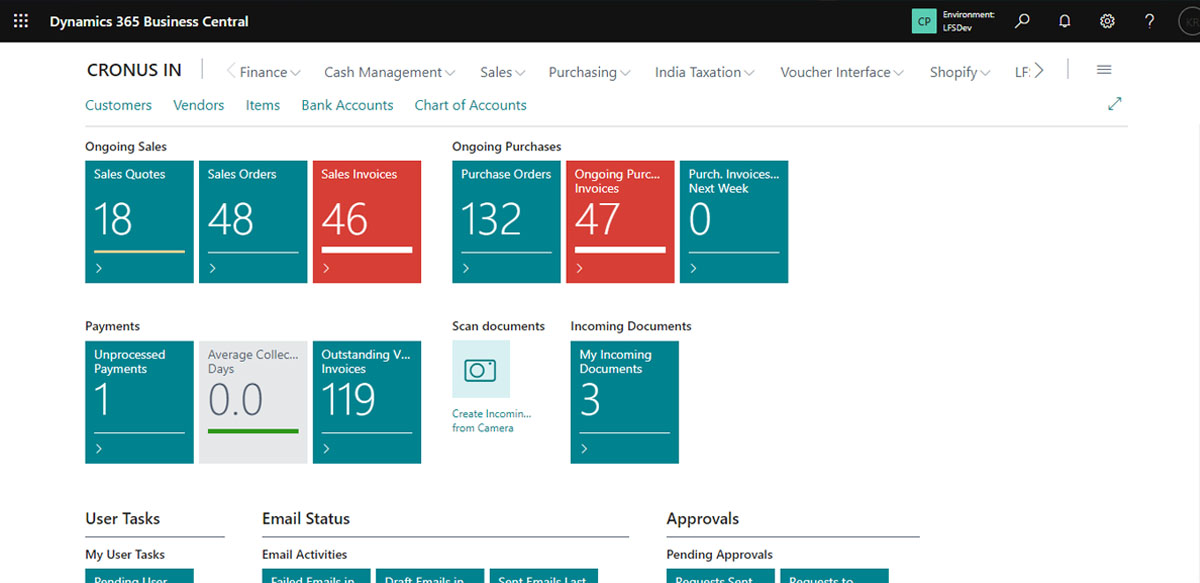
Introduction
Microsoft Dynamics 365 Business Central is a comprehensive business management solution offered by Microsoft. It is designed to help small and medium-sized businesses automate and streamline their operations, including finance, sales, purchasing, inventory, and more.
Business Central offers a range of modules and features that enable organizations to manage their finances effectively. It includes functionalities for general ledger, accounts receivable, accounts payable, bank reconciliation, fixed assets, and cash flow forecasting. Users can track and analyze financial data, generate reports, and make informed decisions to drive financial success.
In addition to finance management, Business Central provides tools for sales and customer relationship management (CRM). Users can manage leads, opportunities, quotes, orders, and invoices, as well as track customer interactions and manage marketing campaigns. The system integrates with other Microsoft applications such as Outlook, Excel, and Power BI, enabling seamless data flow and collaboration across departments.

Business Central also offers inventory and supply chain management capabilities. Users can track inventory levels, manage warehouse operations, handle replenishment, and optimize supply chain processes. The system supports multiple locations, item tracking, serial and lot number management, and assembly management.
Furthermore, Business Central provides project management features, allowing users to create and manage projects, track time and expenses, and monitor project profitability. It also offers service management functionality for companies providing services, enabling efficient management of service contracts, resources, and service orders.
Microsoft Dynamics 365 Business Central is a cloud-based solution, meaning it is hosted on the Microsoft Azure platform and accessible from anywhere with an internet connection. It offers a user-friendly interface and can be customized to suit specific business needs through extensions and integrations.
Overall, Business Central aims to empower businesses with an all-in-one solution for managing their core operations, enabling increased efficiency, better decision-making, and growth.
Exploring the Key Features of Microsoft Dynamics Business Central
Microsoft Dynamics 365 Business Central offers a wide range of key features designed to help businesses manage their operations more efficiently. Here are some of the main features: Exploring the Key Features of Microsoft Dynamics Business Central

- Financial Management: Business Central provides a comprehensive suite of financial management tools, including general ledger, accounts payable and receivable, fixed assets, cash flow forecasting, and budgeting.
- Supply Chain Management: Business Central enables businesses to manage their supply chain more effectively, from procurement to inventory management and order fulfillment.
- Sales and Service: Business Central provides tools for managing the entire sales process, from lead management to invoicing and payment collection. It also includes customer service features, such as case management and service order management.
- Project Management: Business Central provides project management tools that enable businesses to plan, track, and manage projects more effectively, including resource management, project budgets, and time tracking.
- Human Resources Management: Business Central includes human resources management features, such as employee data management, payroll, and time and attendance tracking.
- Business Intelligence and Reporting: Business Central includes built-in business intelligence and reporting capabilities, including Power BI integration, to help businesses gain insights and make informed decisions.
- Integration with other Microsoft Products: Business Central integrates seamlessly with other Microsoft products, such as Office 365, PowerApps, and Power Automate, to enhance productivity and collaboration.
- Cloud-based Solution: Business Central is a cloud-based solution, which means that businesses can access it from anywhere with an internet connection and scale their usage up or down as needed.
Overall, Microsoft Dynamics 365 Business Central offers a comprehensive suite of features designed to help businesses manage their operations more efficiently and effectively.
What are the Benefits of using Microsoft Dynamics 365 Business Central for Business?
There are several benefits of using Microsoft Dynamics 365 Business Central for business, including:
- Streamlined Operations: Business Central integrates various business processes into one system, allowing businesses to streamline their operations and reduce the need for multiple software applications.
- Improved Financial Management: Business Central provides tools for financial management, such as budgeting, cash flow forecasting, and financial reporting, helping businesses to make informed financial decisions.
- Enhanced Supply Chain Management: Business Central enables businesses to manage their supply chain more efficiently, from procurement to inventory management and order fulfillment.
- Better Project Management: Business Central provides project management tools that enable businesses to plan, track, and manage projects more effectively, helping them to complete projects on time and within budget.
- Increased Productivity: Business Central integrates with other Microsoft products, such as Office 365 and Power BI, to enhance productivity and reporting capabilities.
- Improved Customer Service: Business Central provides customer relationship management tools that enable businesses to manage customer interactions more effectively, improving customer satisfaction and loyalty.
- Scalability and Flexibility: Business Central is a cloud-based solution, which means that it can easily scale up or down as a business grows or changes. This makes it a flexible solution for businesses of all sizes.
Overall, Microsoft Dynamics 365 Business Central helps businesses to improve their efficiency, productivity, and profitability by providing a comprehensive, integrated solution for managing their operations.
How much does Microsoft Dynamics 365 Business Central cost?
The pricing for Microsoft Dynamics 365 Business Central can vary depending on several factors such as the number of users, the deployment model (cloud or on-premises), and the specific functionalities and add-ons required. Microsoft offers different licensing options to accommodate varying business needs. Here are some common licensing models:
- Essentials: This licensing option includes core functionalities such as financial management, sales, purchasing, and inventory. The Essentials license starts at a base price per user per month.
- Premium: In addition to the Essentials features, the Premium license includes advanced functionalities like manufacturing and service management. The Premium license is available at a higher price per user per month.
- Team Member: The Team Member license is designed for users who require limited access to read and perform basic tasks across different modules. It is available at a lower cost per user per month.
It’s important to note that the pricing structure may vary depending on the region and any promotional offers available. Additionally, there might be additional costs for implementation, data migration, training, and ongoing support services.
For specific and up-to-date pricing details, it is recommended to reach out to Microsoft or a certified Dynamics 365 partner who can provide accurate pricing information based on your business requirements.
Best Practices for the Implementation of Dynamics 365 Business Central:
Dynamics 365 for Business Central Implementation is a cloud-based business management application. It is an enterprise resource planning solution that provides functionality for finance and accounting, customer relationship management, project service automation, and other modules. One of the most important Dynamics 365 for Business Central Implementation best practices is to make sure that you have the right people in place to implement it. This includes a project manager who can oversee the implementation process and a team of professionals who can work on different aspects of the software.
Business Central Implementation Process
- Establish Clear Goals and Objectives
- Conduct a Thorough Needs Analysis
- Engage with Key Stakeholders
- Plan for Data Migration
- Configure the System
- Provide User Training
- Test and Validate the System
- Establish Ongoing Support and Maintenance
The Dynamics 365 for Business Central Implementation best practices also include assessing your current system, determining what you need from this software, setting up your data migration plan, and testing your environment before going live with it.
How Can Microsoft Dynamics Business Central Help Streamline Your Workflows & Save Time?
Microsoft Dynamics 365 Business Central is designed to help businesses streamline their workflows and save time in a number of ways. Here are some examples:
- Automated Workflows: Business Central includes workflows that automate routine tasks such as approvals, notifications, and data entry. This can help reduce errors and free up time for more valuable tasks.
- Integration with Other Microsoft Products: Business Central integrates with other Microsoft products such as Excel, Power BI, and SharePoint, enabling businesses to automate data entry and analysis, and collaborate with colleagues more efficiently.
- Customizable User Interface: The user interface in Business Central is customizable, so businesses can tailor it to their specific needs. This can help users access the features they need more quickly, reducing the time spent searching for information.
- Mobile Access: Business Central can be accessed on mobile devices, allowing users to access information and complete tasks while on-the
Conclusion
Overall, Microsoft Dynamics 365 Business Central offers a comprehensive and flexible solution for businesses of all sizes, empowering them to optimize their operations, enhance productivity, and drive growth. With its wide range of features, integration capabilities, and focus on usability, Business Central stands as a reliable choice for organizations looking to streamline their business processes and stay competitive in a rapidly evolving digital landscape.